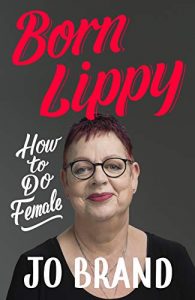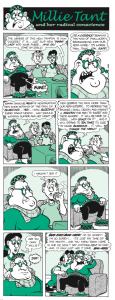
![]()
‘I’m optimistic about the future and I do look forward to women dominating in all areas.’
Is Jo Brand really so fem-centric she doesn’t recognise this’d probably be just as bad as any allegedly male-dominated scenario? Some of the work I do takes place in a very strongly female-dominated area, primary education. And such places are no closer to nirvana as a result – for the women or the men that work in them – than some still male dominated areas like, I dunno, let’s say the road-building industry. [1]
As well as writing about, as her subtitle says, ‘How to Do Female’ [2], she touches on issues that can have a huge impact on the lives of both men and women, albeit from a deliberate and more or less completely female perspective. And some of the areas she covers are foreign territory not only to me as a male, but to women like my wife, as we have no children of our own.
Well, I suppose it’s pretty obvious I’m not the target audience for this book, being male*. But when offered it, via Amazon’s Vine programme, after glancing at the list of topics covered, e.g. ‘how to manage a bully, being different, your family and how to survive it,’ I thought, ok, I’ll have a read. For one thing much of what these phrases cover suggest Brand’s insights might just as well apply to men as well as women. And for another, as a man I want to better understand women, for a variety of reasons.
Putting my own gender to one side momentarily – and I’m not referring to dressing to the left for a change – whilst both candid and reasonably entertaining, Born Lippy is disappointing for being almost entirely anecdotal, i.e. just an extended monologue presenting Brand’s opinions. There’s also something a bit contradictory in how she’s frequently quite self-effacing, and yet ultimately this is a book that’s by and large, like certain friends she suggests one might want to jettison, one person continually talking about themselves. [3]
As a male reader, it disappoints by being practically as sexist, only from the other side of the fence, as much of what she attacks. Leaving aside the purely personal aspects, and that would be most of the book, in favour of the bigger social picture; surely society would be better if it valued more what both sexes want/need, rather than hoping the pendulum swings the ‘other way’, as is suggested by the quote at the top of my review.

The following extract even sounds like exactly the sort of thing to start a booze-fuelled battle of the sexes down the local: ‘just, to be annoying, research shows that being married is better for the man and worse for the woman…’
Funny that, I’ve more often heard/read the exact opposite: marriage suits the needs and desires of the woman, providing a stable ‘nest’ where children can be reared, whilst discouraging the male from being a roaming predatory breeder, instead constraining him to the role of domesticated provider. But, like Jo, I will offer no evidence here, merely anecdotal hearsay.
Indeed, whilst there are plenty of moments where she says things I can relate to, such as people becoming far less polite and tolerant than they might normally be once they get behind the wheel of a vehicle, there are quite a number of moments where she says things that completely contradict my experience. As for example where she says that as soon as you start pushing a pram around you become invisible. I’ve often noticed how a lot of mothers – and it’s noticeably the mothers, not fathers or grandparents or helpful siblings. – use their prams, baby and all, as either battering rams or territorial markers. [5]
Brand’s adult perspectives do seem dominated by a legacy of negative experiences, mostly around the nexus of issues around women’s bodies, beauty, and weight. Her professional success has enabled her to salvage some positives from it all, and that’s really at the core of the best of what this book has to offer.

In the chapter ‘Adventures In Your Head’ Brand sings the praises of books, reading, and literacy. Feelings I share completely. She also addresses whether one should slog through a book one isn’t really enjoying. Well, I did enjoy this just enough to ignore her own advice to ‘give up and find something more interesting.’
All things considered, Born Lippy is ok. I certainly wouldn’t rave about it. It seems to me too simplistic and obvious. Lacking in any great perception, depth, or insight. Sure, we all rage against the machine from time time, for a whole raft of reasons. But this doesn’t give any deep understanding of either the self, female or otherwise, nor the machine.
I suspect, as one might expect, female readers are likely to get more from this. And perhaps those struggling with self-image issues (but then again who, male or female, doesn’t have such struggles at times?) most of all? If Jo Brand reaches folks like them, I guess she’ll have achieved her goal.
* When Brand addresses her reader, it’s pretty much always assumed they’re female. Indeed, the only allusion to a male encountering the contents is a disparaging reference to a female reader reading a part out loud to her partner, as he watches Top Gear, for him to chortle at the use of the word ‘crack’.
** A terrible name for the book, which doesn’t chime at all with her own account of youthful transformation from ‘nice little girl … to reformed ‘Man Hater’ turned National Disgrace.’ But, rather ironically, given Brand’s sensitivity over language and her berating of societal hypocrisy, this misleading but catchy phrase does chime with a popular image of Brand. It works for the marketing department, so fine … great title!
NOTES:
[1] Okay, the women may enjoy or benefit from the fact that it’s a mainly female workforce. But my point is that it’s still a far from perfect working environment. And the fact it’s dominated by women doesn’t make it significantly better. Just different. Regarding roadworks: the parts of East Anglia we inhabit are utterly infested with roadworks of late, from the massive A14 ‘improvements’ to the many closed minor country roads out in The Fens. I’m not sure I’ve seen any women when I’ve driven past all these works. Certainly not doing the labouring work.
[2] I, like Jo, have my own foibles and sensitivities around language. I suppose we all do, to differing degrees. She dislikes the word lady, preferring ‘woman’, and cites being feminist as her reason for this position. Lady implies, to her at any rate, a meekly submissive vision of woman. It doesn’t to me. To me it implies the female equivalent of gentleman, i.e. a well-mannered female. And sensitivity towards the feelings of others has traditionally been a part of what is meant by terms such as lady and gentleman. But as Brand is a dyed in the wool lefty – I used to think I was but, as with Christianity, I ditched such simplemindedness years ago – she lets the fact that many uncouth toffs have labelled themselves as ladies and gentleman tarnish the terms.
She also dislikes such words or phrases as chavs and bingo-wings, both of which I neither really like or dislike, but I feel they convey very well certain ideas and images, some of which have value. Plus bingo-wings is very funny.
A similar sort of case could possibly be made against her preferred word, woman, on the etymological grounds that it derives from the Old English wifman, meaning ‘wife-person’. But it’d be a bit tenuous, so I can’t be arsed. And it even turns out that the word ‘man’ was originally gender-neutral, being more equivalent to person than the common modern gendered understanding. Fascinating! But the politicisation of language is a minefield, and some of Brand’s personal bugbears strike me as almost dourly puritanical, in a pseudo-lefty way, and surprisingly humourless for a person whose stock in trade is laughter.
And as if this titanic footnote wasn’t long enough, and before my numerous digressions prompt me to completely forget, I dislike her choice (or was it an editorial suggestion? such things happen) of ‘do’ rather than ‘be’, in her subtitle. To be something suggests a truth and authenticity, perhaps even born of reflection and conviction, whereas to do something might be ‘merely obeying orders’ (a subject she touches upon when she mentions the infamous Milgram experiments), and sounds totally like modern marketing or business speak, as in let’s do lunch, let’s do the books, or let’s do the sights. It’s an ugly turn of phrase suggestive of objectivised consumerist culture, in my view.
[3] This fact reminds me of when I heard Germaine Greer – who’s cited as a feminist hero of Brand’s – on Radio 4 fairly recently, and it turned out that, not at all surprisingly to me, the entire edifice of her career as a feminist is built, at least in part (and by her own admission), on the troubles she encountered getting dancing partners as an above average height young girl. I.e. a few less inches in height, and she might just have been another happy camper, and we’d have had to wait for her insights to come from some other disgruntled lady at some other time, quite possibly couched in some other terms, rather than ‘woman is the nigger of the world’, or The Female Enoch, etc. A similar thing struck me many years ago when I noticed that many of the most ardent lefties I encountered were simply crap capitalists who liked the sound of their own voices and having a good moan.
[4] In the bit about the female body, periods, menopause, etc, Brand laments that people still don’t talk openly about such things. I agree, and I further agree that the current state of affairs is lamentable. I’m perfectly happy to talk about practically anything. But that doesn’t seem to be the norm. But with works like his Wall of Vagina, artist Jamie McCartney shows it’s not just women who are helping us bring such things out into the open.
[5] In a way that smacks of lack of proof-reading (as well as the numerous typos that the book contains) Brand makes this point, re prams as obstacles to other pedestrians, when she’s talking about manners, kind of contradicting her own invisibility idea. Perhaps it’s that mothers think they have become invisible behind their prams? Is this why so many compensate by thrusting their infants into the roads, or trying, Moses-like, to use them to part the seas of pedestrians?
[6]Viz do their bit for the sisterhood on the theme of menstrual pride.
[7] Cannabis may well wind up providing us with many useful medicines. It’s certainly been looking that way for some time now. But it’s highly unlikely that they’ll be delivered via the rolling and smoking of joints. For one thing the active ingredients that produce the highs and the health benefits are different. But this a whole different topic, for exploration some other time.
